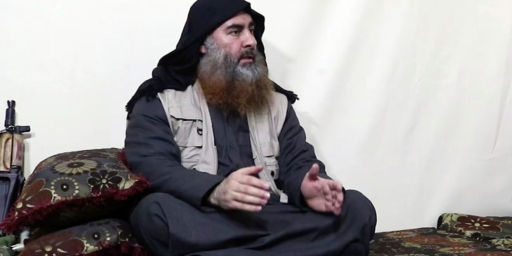London Chemical House Raid Finds No Chemicals
British counter-terrorism officials used a single, unreliable source as cause for last Friday’s raid on a London house believed to be a chemical weapons manufacturing facility. Said house was bereft of chemical weapons.
Senior counter-terrorism officials now believe that the intelligence that led to the raid on a family house last Friday in a search for a chemical device about to be used to attack Britain was wrong, the Guardian has learned. Counter-terrorism officials were under pressure last night after days of meticulous search of the house in east London failed to produce anything to link the two men they arrested to a chemical plot. But a senior police officer said they had been left with “no choice” but to force entry into the house because there was specific intelligence of a threat to public safety.
One official, with knowledge why police acted and what had been found from days of searching, said the intelligence had been acted on correctly, but added last night: “There is no viable device at that house. There is no device being constructed, or chemicals. There does not appear to be anything there or anywhere else.”
As lawyers for the two arrested men continued to protest their innocence, it emerged that the man who had passed the specific information that led to the raid in which a man was shot last Friday was a police informant who had been providing intelligence about the activities of alleged Islamist militants for several weeks. This was despite previous reports quoting police sources that suggested the informant was being handled by the security service, MI5. It was the police who passed the information from the informant to MI5 officers to assess it, the Guardian understands. MI5 and police then agreed the information was specific and credible and made a joint decision it had to be acted upon immediately.
It is understood that attempts to corroborate the information were not made because of the perceived need to act quickly. “If there was an immediate risk to public safety, there would not have been time to bug the house,” an intelligence source said. A counter-terrorism official said: “If the intelligence was right there was a serious risk to the public. We did not know if it was right or not until we went in.” Another official added: “Intelligence is patchy. Even if it suggests a 5% likelihood of something nasty, we can’t take that risk”.
But what remains puzzling is the reliance on a single apparently uncorroborated source for information that prompted a high-profile mass raid which, even without the shooting of one of the men, would have provoked a strong reaction. Andy Hayman, the Met’s assistant commissioner specialist operations, refused to apologise for the raid yesterday while admitting that so far officers had not found the specific item they were looking for – thought to be a chemical device – in the terraced house in Forest Gate which was the subject of a pre-dawn raid involving more than 250 officers, including armed teams and government scientists.
There’s something vaguely familiar about this scenario but I’m unable to put my finger on it.






The police track record so far is underwhelming. I’m going to be very skeptical of any future initial reportings about busting up terrorist cells. We’ll see what the real deal is with the Canadian case soon.
James there are similarities, but the differences are blaring. For instance, every major intel service in the world believed Saddam had WMD, and one, Mossad states the WMD was moved to Syria, with the help of Russian Speical Forces. This is credible, because of Iraqs possession of secret Russian items used to defeat the accuracy of our smart weapons. Just because you can’t find something does not mean it was never present. After all, Saddam did not account for what the UN knew he had. It is still unaccounted for.
I’d like to see some proof of ‘every major intel service in the world believed Saddam had WMD,…’ dated, of course, *after* Blix & Co went through the list of suspected sites.
As to the idea of the WMD’s (‘vast stockpiles’, remember) being moved into Syria, leaving nothing behind – well, maybe we should purchase some of that Star Trek transporter technology that they had to have used.
Quite so, Barry. The only reason “every”, or in fact, “any” intel service believed Saddam had WMD gear is because we told them he did.
It’s like writing a check to pay the fines for writing bad checks – lies built on top of lies…
I thought this post was about London…
Anywhoo…
I would like to know, irrefutably, where the WMDs in question are, or how, when, where they were destroyed.
WMD policy is the one thing you don’t get a second chance to make a mistake about. I’d rather not count on Saddam’s good will or willingness to comply, or on the political motivations of those who want to lose a war to discredit an administration.
WMD – Stop living in the clouds. I am sure the French, Germans and Russians were not relying on the US for their intelligence and they said Saddam had WMD. The Israelis do not rely on the US and they said the same.
The only dispute was whether to go to war. I would suggest that the Oil For Food scandal should have put to bed any idea that those not wanting to go to war had anything other than a financial motive.